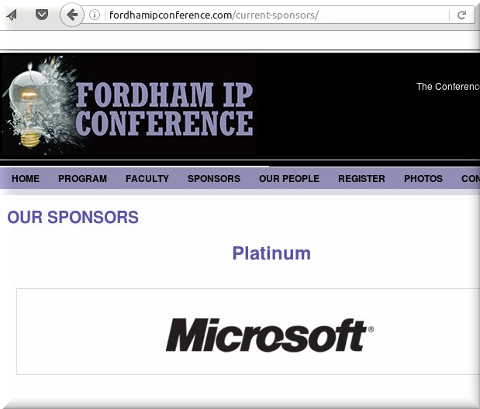

Featuring Microsoft-sponsored 'speaker' (lobbyist), David Kappos for software patents and against ۤ 101
THE USPTO does not wish to comply with courts' will. The US patent system is so greedy that it continues to grant a lot of software patents, even when most of them, once properly challenged in a court using Alice, get invalidated. There are still the occasional patent cases where in spite of Alice the software patents survive. One such case has just been covered here and it says: "The court denied defendant's motion for summary judgment that the asserted claims of plaintiff’s network security patents encompassed unpatentable subject matter and found that the claims were not directed toward an abstract idea."
"The US patent system is so greedy that it continues to grant a lot of software patents, even when most of them, once properly challenged in a court using Alice, get invalidated."Meanwhile, patent maximalists are bemoaning the new post-Alice reality, quoting lots of other patent maximalists or lawyers. "It’s getting harder to patent software," says the headline of this new article. Well, this sounds like excellent news. Software algorithms should never have been patentable in the first place. The author says: "Software patents have been under increased scrutiny for several years due to their malicious use by non-practicing entities, or patent trolls – persons or companies that do not necessarily invent or manufacture anything, but that purchase patents, often from bankrupt countries, and subsequently sue others for infringement."
Composed by Charles Bieneman, another new article asks, "How Do Biotech Patent-Eligibility Cases Speak to Computer Patent-Eligibility Cases?"ââ¬â¹
"They're trying to put an end to invalidations under 35 U.S.C. €§ 101 and they're funded by large corporations to do so. Their clients (including Microsoft) pay them to mislead politicians and to lie to the public."To quote the opening paragraph: "The Federal Circuit recently held that a claim of U.S. Patent No. 5,612,179, reciting “methods of detecting genetic variations” was directed to unpatentable subject matter under 35 U.S.C. €§ 101. Genetic Technologies Ltd. V. Merial, LLC, Nos. 2015-1202, 2015-1203 (Fed. Cir. April 8, 2016). Anytime the Federal Circuit weighs in on Section 101 patent-eligibility, those of us in the patent bar scramble to comprehend the potential impact to pending patent applications and issued patents alike. For those of us who practice in the computer area, the question arises: how are we informed, or are we informed, by a holding concerning patent claims directed to genetic analysis?"
It's always noteworthy when CAFC throws away patents like these because software patents originally came from CAFC. Notice the trend now. The courts which once supported software patents no longer do. It must be a scary time to be a patent lawyer in this particular area/domain.
In his final part (part of a long paper), Robert Sachs (patent lawyer) makes it clearer that he was just pushing for software patents all along. To quote his final words: "The fictional form of the mental steps doctrine represents a significant and unwise departure from the factual form. The fictional form is untethered from the conceptual and technological attributes of computer design, the nature of human cognition, and the practical reality and value in computer-implemented inventions. The courts should return to the doctrine’s factual form, and avoid a further descent into the fact-free analysis that now characterizes patent eligibility."
"One sure thing is, software developers are absent/left out of this whole debate."This is becoming similar to the infamous whitepaper from David Kappos and his recent lobbying for software patents. They're trying to put an end to invalidations under 35 U.S.C. ۤ 101 and they're funded by large corporations to do so. Their clients (including Microsoft) pay them to mislead politicians and to lie to the public. Watch another new example of lobbying for software patents, again taking the shape of a "conference", just like those funded by Microsoft nowadays [1, 2]. As Cathy Gellis put it: "At this conference on IP in software there's not nearly enough discussion on WHY ON EARTH DO WE NEED IT."
"Judge Dyk acknowledges that patent law is not limitless, and that patentable subject matter should not be completely unbounded," Patently-O noted the other day.
Who's going to win? The courts, the USPTO, or lobbyists and their affluent clients? One sure thing is, software developers are absent/left out of this whole debate. It's quite a travesty really. ⬆